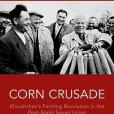《Corn Crusade》是Oxford University Press出版的圖書,作者是Aaron T. Hale-Dorrell
基本介紹
- 書名:Corn Crusade
- 作者:Aaron T. Hale-Dorrell
- 出版社:Oxford University Press
- 出版時間:2019年2月1日
- 頁數:328 頁
- 裝幀:Hardcover
- ISBN:9780190644673
- 售價:GBP 47.99
內容簡介
Corn Crusade: Khrushchev's Farming Revolution in the Post-Stalin Soviet Union is the first history of Nikita Khrushchev's venture to cover the Soviet Union in corn, a crop common globally but hitherto rare in his country. Lasting from 1953 until 1964, this crusade was an emblematic component of his efforts to resolve agrarian crises inherited from Joseph Stalin. Using policies ...(展開全部) Corn Crusade: Khrushchev's Farming Revolution in the Post-Stalin Soviet Union is the first history of Nikita Khrushchev's venture to cover the Soviet Union in corn, a crop common globally but hitherto rare in his country. Lasting from 1953 until 1964, this crusade was an emblematic component of his efforts to resolve agrarian crises inherited from Joseph Stalin. Using policies and propaganda to pressure farms to expand corn plantings tenfold, Khrushchev expected the resulting bounty to feed not people, but the livestock necessary to produce the meat and dairy products required to make good on his frequent pledges that the Soviet Union was soon to "catch up to and surpass America." This promised to enrich citizens' hitherto monotonous diets and score a victory in the Cold War, which was partly recast as a "peaceful competition" between communism and capitalism. Khrushchev's former comrades derided corn as one of his "harebrained schemes" when ousting him in October 1964. Echoing them, scholars have ridiculed it as an "irrational obsession," blaming the failure on climatic conditions. Corn Crusade brings a more complex and revealing history to light. Borrowing technologies from the United States, Khrushchev expected farms in the Soviet Union to increase productivity because he believed that innovations developed under capitalism promised greater returns under socialism. These technologies generated results in many economic, social, and climatic contexts after World War II but fell short in the Soviet Union. Attempting to make agriculture more productive and amelio

